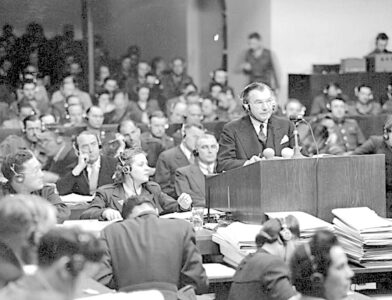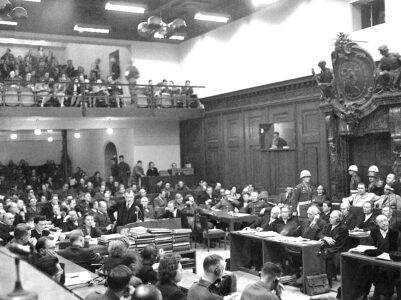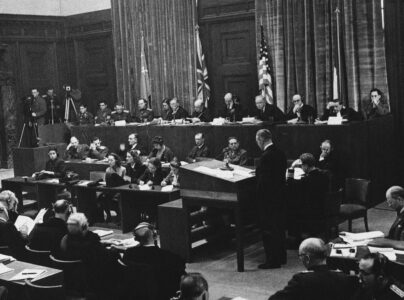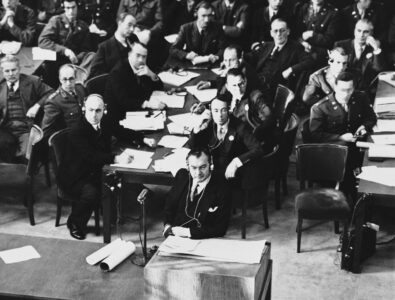Jackson Center part of yearlong Nuremberg war crimes anniversary
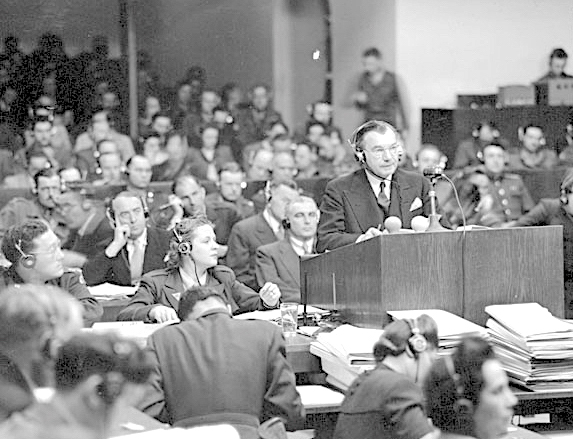
AP Photos Robert H. Jackson is pictured at the Nuremberg trials.
- AP Photos Robert H. Jackson is pictured at the Nuremberg trials.
- A general view of the court-room at the Palace of Justice, Nuremberg, Germany, where the trial of Nazi war criminals was held. Associate Justice Robert H. Jackson, the U.S. representative and chief counsel for the prosecution, made his address here on Nov. 21, 1945. Jackson tore to pieces the attempt by the German defense to challenge the legality of the court, and said that “four great nations, flushed with victory, and stung with injury, stay the hand of vengeance and voluntarily submit their captive enemies to the judgment of the law is one of the most significant tributes that power has ever paid to reason.”
- U.S. Prosecutor Robert H. Jackson speaks against the defense counsel’s motion that the case against Krupp von Bohlen be dismissed in Nuremberg, Germany, Nov. 27, 1945, during the Krupp hearing.
- Justice Robert H. Jackson, chief U.S. Prosecutor, opens the prosecution’s case before the four allied judges at the war crime trial at Nuremberg, Germany, Nov. 21, 1945. Judges and alternates at bench are (left to right): Alternate A. F. Volchoff and Judge I. T. Nikitchenko of Russia; Alternate Sir Norman Birkett and Judge Sir Geoffrey Lawrence of Great Britain; Judge Francis Biddle and Alternate John Parker of the United States, and Judge Henri DeVabre and Alternate Robert Falco of France. Mr. Jackson is standing, right foreground.
With those words, spoken 80 years ago today, Robert H. Jackson began the war crimes trials in front of the International Military Tribunal at Nuremberg. After serving as U.S. Attorney General and a respected U.S. Supreme Court Justice, Jackson completed his journey from Spring Creek, Pa., and Jamestown, N.Y., onto the biggest of world stages.
Over the next 11 months Jackson helped set legal precedent that has been followed to this day when war crimes across the globe are prosecuted. And, starting today, the Jamestown non-profit that bears Jackson’s name is taking part in a remembrance of the trials and Jackson’s role in them.
The Robert H. Jackson Center will be part of a year-long international symposium, with a host of virtual events that work with institutions from around the United States, in Germany, and in the United Kingdom.
On Nov. 14, 1945, Justice Robert Jackson would enter his appearance before the International Military Tribunal at Nuremberg.
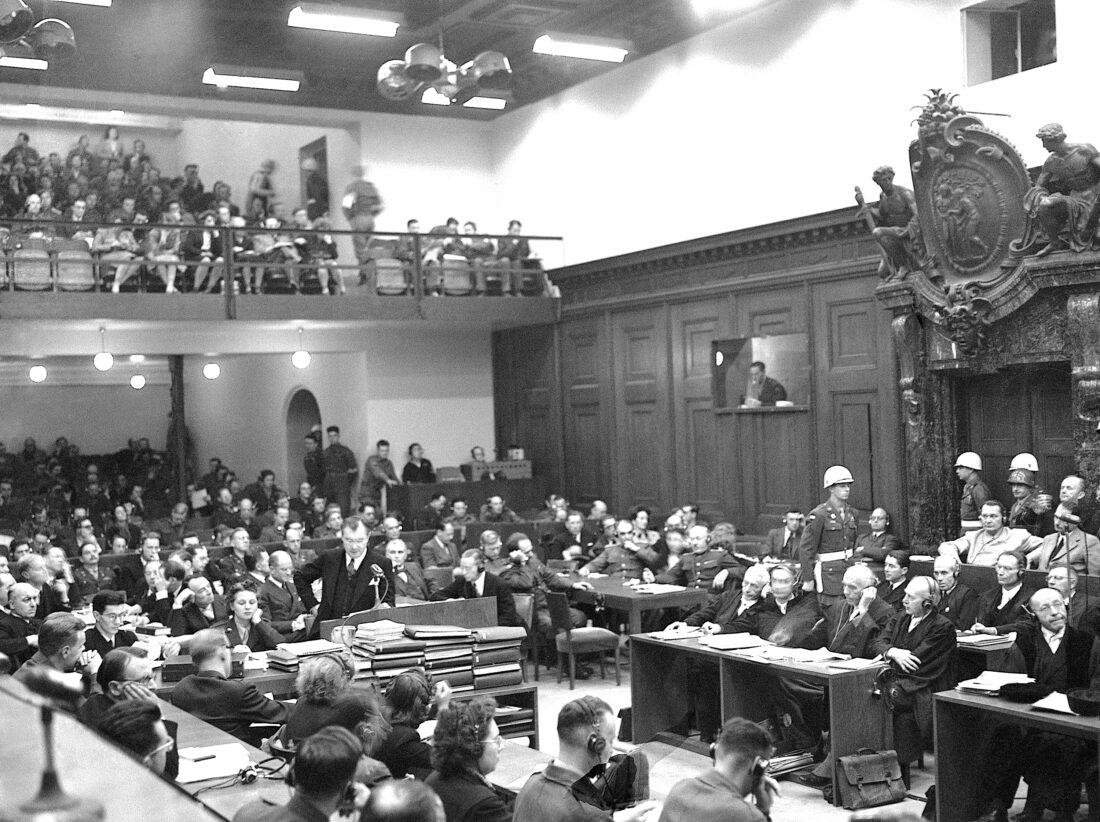
A general view of the court-room at the Palace of Justice, Nuremberg, Germany, where the trial of Nazi war criminals was held. Associate Justice Robert H. Jackson, the U.S. representative and chief counsel for the prosecution, made his address here on Nov. 21, 1945. Jackson tore to pieces the attempt by the German defense to challenge the legality of the court, and said that “four great nations, flushed with victory, and stung with injury, stay the hand of vengeance and voluntarily submit their captive enemies to the judgment of the law is one of the most significant tributes that power has ever paid to reason.”
The tribunal was preparing to begin hearing arguments on the indictments of several nazi war criminals. The tribunal would meet initially on Nov. 14, 1945, for a pretrial session to discuss the defense’s motion to suspend proceedings for Gustav Krupp von Bohlen und Halbach on the argument of serious illness. The defense would allege that this serious illness consisted of brain damage and mental decline, John Barrett, Benjamin N. Cardozo Professor of Law, St. John’s University, New York City and Elizabeth S. Lenna Fellow at the Robert H. Jackson Center, wrote in an email to “Jackson List.”
When the trial began Nov. 21, 1945, Jackson’s opening statement – which encompasses 50 typewritten pages – was delivered over four hours.
“The refuge of the defendants can be only their hope that International Law will lag so far behind the moral sense of mankind that conduct which is crime in moral sense must be regarded as innocence in law,” Jackson said as he closed his opening statement 80 years ago. “We challenge that proposition. Civilization asks whether law is so laggard as to be utterly helpless to deal with crimes of this magnitude by criminals of this order of importance. It does not expect that you can make war impossible. It does expect that your juridical action will put the forces of International Law, its precepts, its prohibitions and, most of all, its sanctions, on the side of peace, so that men and women of good will in all countries may have ‘leave to live by no man’s leave, underneath the law.’ The refuge of the defendants can be only their hope that International Law will lag so far behind the moral sense of mankind that conduct which is crime in moral sense must be regarded as innocence in law. We challenge that proposition.”
So began nine months of strenuous work at the Palace of Justice Courtroom 600 for Jackson, who had been selected by President Harry Truman to represent the United States and serve as the chief prosecutor in the trials. Jackson would go on to lead prosecution against 22 defendants, 19 of which would be found guilty by the tribunal.
Efforts to begin the coordination of the symposium commemorating the Nuremberg war crimes trials began with Jackson Center officials wanting to put together an unprecedented event to commemorate the importance of this anniversary, according to Robert H. Jackson Center President Kristen McMahon. McMahon said it is important to remember the International Military Tribunal at Nuremberg and acknowledge the creation of the modern International Criminal Justice System standards that resulted from the trials.
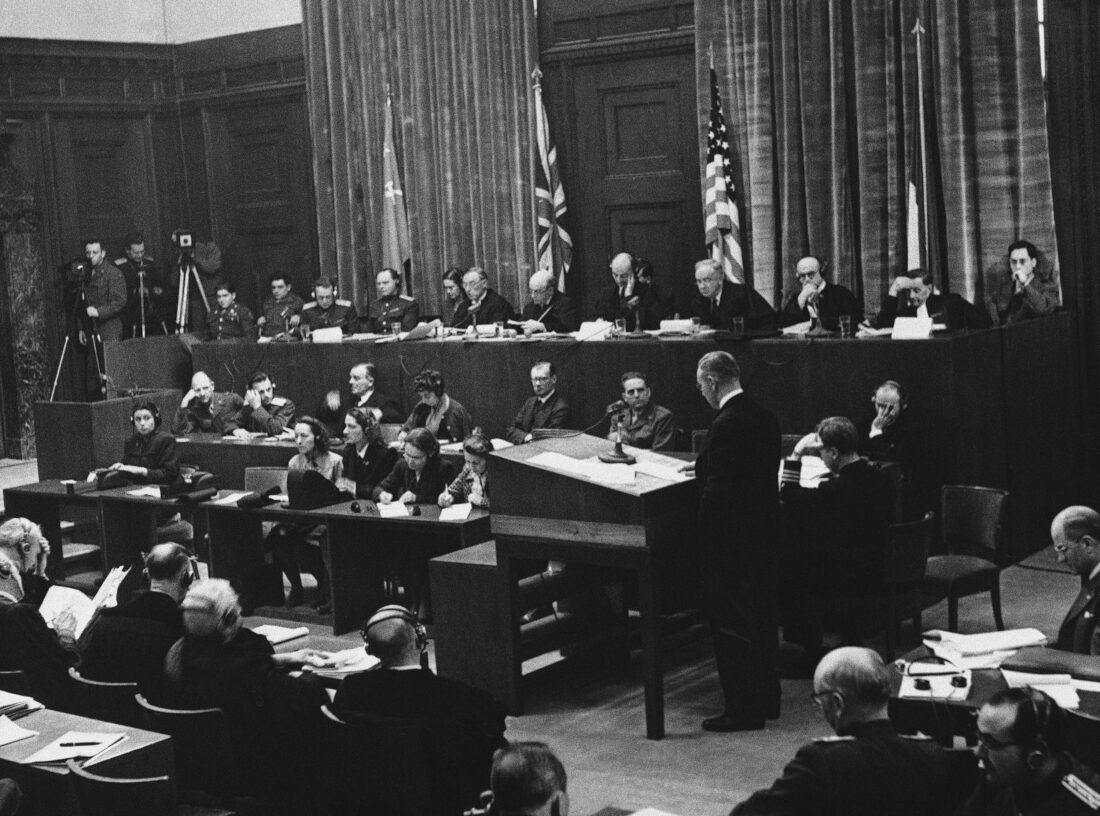
U.S. Prosecutor Robert H. Jackson speaks against the defense counsel’s motion that the case against Krupp von Bohlen be dismissed in Nuremberg, Germany, Nov. 27, 1945, during the Krupp hearing.
“We wanted to work with as many people who touched that part of the world as we could … for example, our partnership with the Truman Presidential Library and Museum. Harry Truman was the president that appointed Jackson to that Chief Prosecutor role,” said McMahon. “So we have a number of pockets of these organizations that continue, and carry on with, the legacy that Jackson and his international colleagues established.”
McMahon noted all of the programs in the event list are virtual programs, with a few in-person options being potentially considered for down the road. The virtual programming was a result of the partnerships with a range of worldwide institutions, as the Jackson Center workers wish for everybody to have the opportunity to tune into any of the programs.
The symposium kicks off today from noon to 1 p.m. with a virtual tour of Courtroom 600, where the trial took place. The second event will be a panel discussion on the continued importance of the presidents set by the Nuremberg Trials, and will occur on Dec. 1 from 12:30 to 2 p.m. The chair for the panel will be International Criminal Court Justice Joanna Korner, with numerous other guest speakers planned to be in attendance.
Other guest speakers include former ICC judge and current Independent Advisor on War Crimes to the Ukrainian Prosecutor General Howard Morrison, International Barrister and Head of the International Practice Group at 9BR Chambers Gillian Higgins, University of London Diplomacy and Strategy Professor Dan Plesch, University of Georgia International Law Professor Diane Marie Amann, University of Georgia International Law Chair and Co-Directors Emily and Ernest Woodruff, and International Nuremberg Principles Academy Director Dr. Christoph Stafferling.
There are 10 other events, through various partnerships, that the center has planned at the moment. Partnering institutions for the remaining events include the Harry S. Truman Library and Museum, Courtroom 600, the Centre for European Law and Internationalisation, the American Society of International Law, the Churchill Archives Centre, the International Nuremberg Principles Academy, the Portals to Peace Foundation, and the Global Institute for the Prevention of Aggression. These remaining events are all scheduled to occur in 2026, beginning on Jan. 9 and going until Oct. 9.
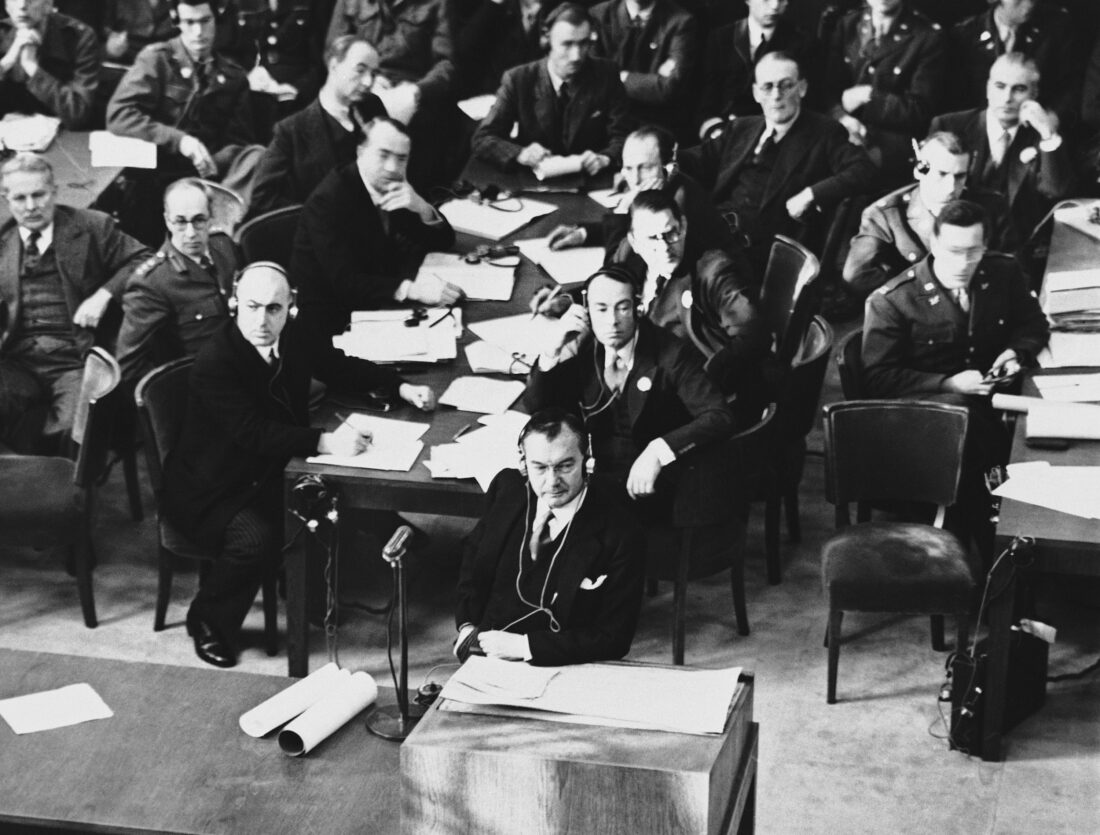
Justice Robert H. Jackson, chief U.S. Prosecutor, opens the prosecution’s case before the four allied judges at the war crime trial at Nuremberg, Germany, Nov. 21, 1945. Judges and alternates at bench are (left to right): Alternate A. F. Volchoff and Judge I. T. Nikitchenko of Russia; Alternate Sir Norman Birkett and Judge Sir Geoffrey Lawrence of Great Britain; Judge Francis Biddle and Alternate John Parker of the United States, and Judge Henri DeVabre and Alternate Robert Falco of France. Mr. Jackson is standing, right foreground.
McMahon stated the hope that guests of these events take away a knowledge not only of how important the Nuremberg Trials were historically, but how important the precedents it set continue to be today. Hopefully, the event will help people understand how relevant the precedents and past standards are in international conflicts today, according to McMahon.
“I think one thing that we’re hoping audiences take away from this is how much these conversations are still continuing today,” said McMahon. “That these concepts of justice and that work in particular, that has been going on since 1945, it’s in our current timeline. We have in the news the Russian Federation Invasion of Ukraine, and obviously the war between Israel and Hamas, and in Sudan. All of these are things that the International Criminal Law community will be taking a look at”
A full list of the scheduled events, along with times and partnered institutions, is available on the center’s website at www.roberthjackson.org/80-years-of-nuremberg-an-international-reflection/. Those interested can also register for virtual attendance online. For more information contact 716-483-6646.

